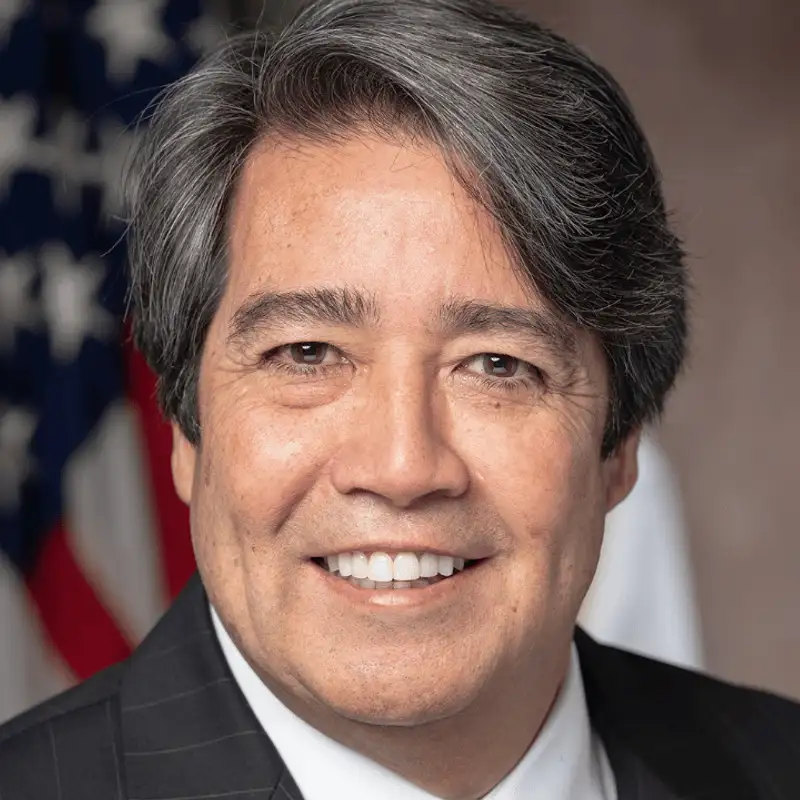Gene Rodrigues - Strategically Aligning Energy Efficiency
Download MP3Ted Flanigan first met Gene Rodrigues in 1998. Ted was Director of Efficiency Solutions at LADWP; Gene the Director of Energy Efficiency at Southern California Edison. For years, Gene was the voice and the face of energy efficiency, his sincere and happy demeanor on local television in the evenings. Ted and Gene begin with a reflection that Ted recounted of Gene's mother making sure that Gene knew that every morning that he had a choice about the day ahead. She made clear that you have the choice to be happy and productive each day.
Gene was born in Japan to a U.S. serviceman and a Japanese mother. He grew up in Arizona before getting his law degree. In short order he realized that he wanted his law to be important, to make a difference to our society. He applied that vision to his work in regulatory law at Southern California Edison. He became Director of Efficiency, a role that expanded to include distributed energy resources of all kinds.
The conversation shifts to Gene's deep appreciation for the field of efficiency... what he calls a foundational element for every utility to boost reliability and local economic development, to cut consumer costs and increase affordability, while protecting the environment at least cost. Gene stressed that California did it right, aligning good business sense with environmental concerns, and meeting the needs of all stakeholders. Calling it a group effort in California, he saluted leaders, John Bryson, Mike Peevey, Ralph Cavanagh, and Art Rosenfeld. They were successful in defining the role of efficiency. Gene explains that it's not a soft customer service, but part of the make-up of a reliable energy system.
Gene left Edison in 2014 to work for the consulting firm ICF, noting that it was a company whose "moral compass was facing due north." When reflecting on his work there in the ICF Clean Energy division, Gene notes that he is most proud of the collaborations that he helped seed and nurture in meetings of cohorts. He found those forums most impactful.
The conversation ends with a discussion of Gene's tenure at the U.S. Department of Energy where he served the Biden/Harris administration as Assistant Secretary of Energy in the Office of Electricity. While the DOE's Forrestal Building is stark, formidable, and intimidating, Gene stressed that he found the staff there to be the most committed group he has every worked with. His heart aches for the current administration's policy to decimate the role of these non-political, career servants. So then, asked Ted, "Are you optimistic?" Gene said no, he is not optimistic about the current changes, but he commented that when he was appointed, he was confirmed by a voice vote of unanimous consent, representing both sides of the aisle. Gene said, those on the R side are still there. While they knew that Gene came from a deep green background, importantly, they understood his common sense approach to energy management. And they are still there.
Gene was born in Japan to a U.S. serviceman and a Japanese mother. He grew up in Arizona before getting his law degree. In short order he realized that he wanted his law to be important, to make a difference to our society. He applied that vision to his work in regulatory law at Southern California Edison. He became Director of Efficiency, a role that expanded to include distributed energy resources of all kinds.
The conversation shifts to Gene's deep appreciation for the field of efficiency... what he calls a foundational element for every utility to boost reliability and local economic development, to cut consumer costs and increase affordability, while protecting the environment at least cost. Gene stressed that California did it right, aligning good business sense with environmental concerns, and meeting the needs of all stakeholders. Calling it a group effort in California, he saluted leaders, John Bryson, Mike Peevey, Ralph Cavanagh, and Art Rosenfeld. They were successful in defining the role of efficiency. Gene explains that it's not a soft customer service, but part of the make-up of a reliable energy system.
Gene left Edison in 2014 to work for the consulting firm ICF, noting that it was a company whose "moral compass was facing due north." When reflecting on his work there in the ICF Clean Energy division, Gene notes that he is most proud of the collaborations that he helped seed and nurture in meetings of cohorts. He found those forums most impactful.
The conversation ends with a discussion of Gene's tenure at the U.S. Department of Energy where he served the Biden/Harris administration as Assistant Secretary of Energy in the Office of Electricity. While the DOE's Forrestal Building is stark, formidable, and intimidating, Gene stressed that he found the staff there to be the most committed group he has every worked with. His heart aches for the current administration's policy to decimate the role of these non-political, career servants. So then, asked Ted, "Are you optimistic?" Gene said no, he is not optimistic about the current changes, but he commented that when he was appointed, he was confirmed by a voice vote of unanimous consent, representing both sides of the aisle. Gene said, those on the R side are still there. While they knew that Gene came from a deep green background, importantly, they understood his common sense approach to energy management. And they are still there.

